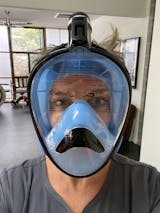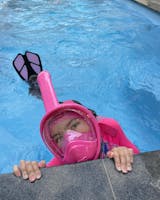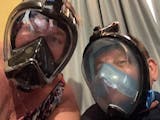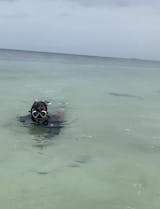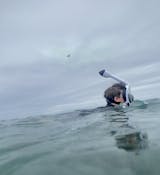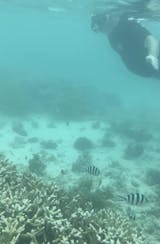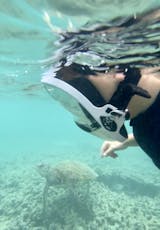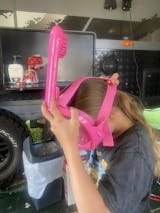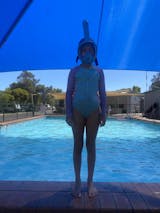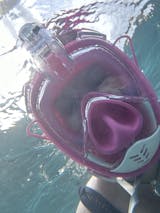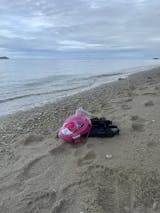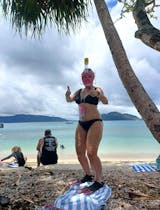No Products in the Cart
Recently we went on a cruise to the South Pacific with lots of opportunities to snorkel. I was asked so many times "are they prescription lenses in there" & "where did you get them from".
The lenses were awesome, I was able to see and enjoy the snorkelling. Others tried mine and were amazed how good they were. As they were suctioned to the mask it made sure the mask was in the correct position on you face (not too high/low). Initially my lenses were a little tight to put together but they went in alright in the end :)
It was easy to find out what level (prescription/strength) was needed, I just went to my optometrist with the options and they told me which ones I needed.
We bought these snorkel masks as we were going on a tropical holiday which included snorkelling tours and we both hated breathing through traditional plastic snorkels shoved in our mouths. My partner in particular did not want to snorkel because of this. These snorkel masks are FANTASTIC and were GAME CHANGERS. We did several lots of snorkelling on our holiday and every time, we were able to lie in the water, breathe normally and focus on looking underwater without worrying about breathing. Even if you dive underwater with these masks, the valve blocks water from coming into your snorkel mask. I bought the premium Equaliser Pro with the ability to pinch your nose if diving and my partner bought the basic model. Both are fantastic products - comfortable, easy to wear and highly recommended. You need to fit it tightly but it's really comfortable in the water and doesn't leak. Even when you come up you don't need to take it off, just keep breathing normally. I loved snorkelling with this product and even my anti-snorkelling partner really enjoyed it and felt this mask was a game changer.
Never snorkelled in my life. Petrified of putting my head under water. But now my neck is bad - if I don't alter the way I swim - then no more swimming for me. This has opened 'a whole new world' - (haha -that songs stuck in your head now) - to me. I'm just using my ninja gear in my gym outdoor pool atm. My legs are getting so strong - and my lungs too - as I'm doing some great breathing. I have huge surgery coming up soon - and i believe this is allowing me to get to a great level of fitness - in preparation. Honestly - i can't go on enough about this product enough. My friend bought a cheaper version. She's given it away already... say no more 🤿🤿🤿
This is the best snorkel mask I’ve ever had. Very comfortable on face, easy to breathe. I am not a good swimmer, it makes me feel safe and enjoy snorkelling without distraction. Thank you ninjiashark.
Got one of these for me and my 7 year old daughter for Xmas. We’ve used them twice already and love them!! So much easier to breathe, can see so much and just makes the whole snorkelling experience better! Would highly recommend!
The best snorkel and mask combination. No going back now! I could snorkel for over an hour easily. So glad I made this purchase
While travelling in Timor leste l met a fellow snorkeller. We snorkelled for 10 days together the food was shit but the water was stunning. The friend was using Ninja Shark fins and mask mine were steaming up, letting in water and heavy. On arriving back in Australia l ordered straight away.
I was a little bit anxious on receiving my order as the mask was quite different to my old one and the fins were short and adjustable ( l wanted them to be my size ! ) well to my luck the weather was beautiful ( yes mid winter in Mackay ) and perfect for boating so off we scooted to Cockermouth ( don't laugh it's a real place ) jumping in and WOW I'm now a mermaid 🧜♀️ the mask and fins felt like part of me. I actually cried as not only was the equipment allowing me to explore as l wanted but the reef was STUNNING. So lm indepted to Ninja Shark for making me the mermaid l always aspired to be 🧜♀️
I wasn’t quite sure about getting a full face mask but bought mine (Electra package) before a trip to Tahiti which we got home from yesterday - absolutely LOVED it!!! I’ll be getting one for my wife before our next trip to a similar destination. BTW I make LOTS of crazy videos with lots of toys.

I do love my full face snorkel.. the freedom of nose breathing under the water.. the meditative and relaxative effect of this snorkeling is unexpected and great. Fits so well.. comfy to wear for long time.. highly recommend
So happy we got Ninja shark, perfect for Great barrier reef snorkel day.
Flippers, mask, dry wallet, carry bag (good quality bag), anti fog spray, happy days.
We recently brought the Ninja Shark Kids 3-11 Mask + Fins + Bag package for our 7 year old who absolutely loves it! Will be buying three more for the rest of the family. 😊
I saw the kids full face snorkel masks online, and thought they looked pretty cool. I ordered two for Christmas, for my 3 and 6 year olds. Wow, did they have a great time with them!
I wasn't sure how the 3 year old would go with it, but he was comfortable in it almost immediately, and spent hours swimming around and seeing a whole new world of underwater scenery.
They were easy to fit, zero issues with them staying on. No leaks or fog.
They can't wait to get back to the water!
Highly recommend this product :)
The mask did exactly what was stated. I was very happy and will get another mask for my daughter.
I have NEVER been able to snorkel but love swimming. These full face snorkels are an absolute game changer in my life. Now I try to swim around 5 kms a week in the local pool. The Ninja mask makes it easy to do laps. I’ve been using the Ninja Shark for a quite few years and find the new Electra the best full face mask ever. No leaks, no fog and really easy to use and great quality. I’ve noticed my regular chats with other swimmers at the pool have encouraged many of them to purchase one of their own. I’ve given my older models to my grandkids and they love them too.
I got one for the 3 year old and one for the 5 year old, I thought maybe the 3 year old would get the hang of it eventually but they both loved it and mastered it pretty quickly. We’ve only used in the swimming pool, excited to go snorkeling in the ocean soon. Great product.
Bought these for myself and my husband after getting the full face masks for the kids, and they were so good we’re getting them for the rest of the extended family for Xmas. The fact u can dive down and not get water down ur snorkel is a brilliant bonus! Makes our family holidays much easier and better without snorkel dramas!
The product itself was amazing, but the service we received allowed us to get our 2 sets of masks for our cruise. We took them with us and used them multiple times for snorkelling on our cruise to Nouméa and New Caledonia. It was amazing snorkelling and being able to breathe easily, and the fins were the most comfortable I've ever used. I've got size 13 feet, and not only were they completely adjustable, but they were THE most comfortable fins ever invented. A massive shoutout to Colleen Zamora from your support staff who helped me out and made it possible to take our gear on holidays! Thanks Colleen!
The photo is us snorkelling off Amadee Island looking for turtles!
I’ve got three of these masks for my younger kids, however the oldest wants one too as the young ones rave about how good the are.
Our Ninja masks have made snorkelling as a whole family very easy and enjoyable. The kids (and parents) find them super easy to use and have allowed us as a family of five to snorkel for longer than we ever could using traditional snorkel gear. I would highly recommend these masks.
Love this mask. Kids find it so much easier snorkelling with the Ninja Shark. The snorkel mask is super clear and doesn’t fog up. The adjustable straps are great and easy to loosen and tighten. Very happy that we made the decision to get these for the kids.
Recently purchased the Equaliser Pro Mask, Finns and bag. 🤿 🐠🐡🐟🦈 Had an amazing time snorkeling off Fitzroy Island, the Pro mask allowed me to explore for over 7 hours. Higly recommend! Planning must next snorkeling trip! 🤿💦🌴☀️




























